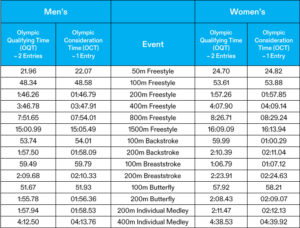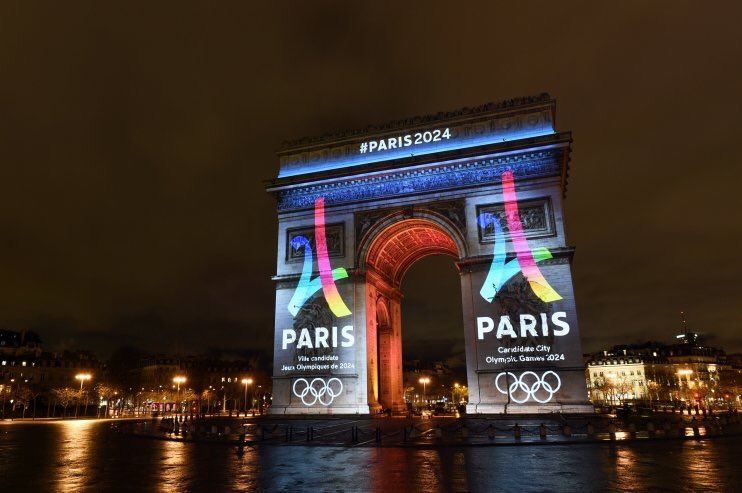Editor’s Note: FINA says that the document that contained these standards is “out of date,” without elaborating.
FINA has published the qualifying time standards for the Paris 2024 Olympics. The news comes after the Paris 2024 organizing committee released a brand-new 9 day swimming schedule for the Olympics, in which swimming will run from July 27th to August 4th, 2024. If you wish to view the full release from FINA, click here.
FINA also released their criteria for creating these time standards. You’ll notice there are two cuts for each event, an Olympic Qualifying Time (“OQT”) and an Olympic Consideration Time (“OCT”). These cuts can only be achieved from March 1, 2023 to June 23, 2024. As always, each country or NOC (National Olympic Committees) is permitted to qualify a maximum 2 swimmers per individual event, as well as one relay team per relay event.
The OQT standards were set at the time it took to finish 14th in prelims of each event at the Tokyo 2020 Olympics, while the OCT standards are 0.5% slower than the OQT.
Athletes who achieve an OQT will be automatically qualified for the Olympic Games, provided their NOC hasn’t yet reached the 2-swimmer quota in that event. There will be an 852 athlete quota for swimming at the Paris Games. Once all the swimmers who achieve OQT cuts are invited, the remaining spaces within the 852 swimmer quota will be filled with those who achieved the OCT time standard, again provided their NOC hasn’t yet reached its quota in the event. One swimmer who achieved an OCT standard will be invited in each of the 28 events, and that process will repeat until all 852 spots are filled.
Notably, the 852 swimmer quota is a reduced number from the Tokyo Olympics. In Tokyo, 878 swimmers were permitted to enter. Paris 2024 has reduced the overall number of athletes competing across all sports by approximately 600, therefore each individual sport saw a small reduction in the number of athletes allowed to enter.
Also included in FINA’s announcement: each relay event will be capped at 16 entries, which is in line with previous Olympics.
Now without further ado, here are the time standards for the Paris 2024 Olympics:


1,58,53 for the 200 IM is stupidly fast
The B times or consideration times are really not in play any longer. Even in Tokyo there were very few swimmers who qualified through the B times. With 850 swimmers allowed to enter there are a 400sih A qualifiers, another 100 or so who get through on being relay swimmers and then the universality swimmers.
The qualifying standards are so tough that the majority of countries will not have A qualifiers. There will be over 100 countries allowed to send one male and one female on universality.
You get to 850 swimmers really quickly when there are about 150 countries who want to send swimmers to the Olympics.
agree, this helps the Games become even less relevant for the world of swimming at large. It’s a handful of the best swimmers coming together to compete against each other. An ISL in long-course type of event, not sure how to solve for this
Seems the OCT time is getting more ridiculous, in Rio it’s 3.5% from the A-cut, in Tokyo it’s 3.0%, and all of the sudden it jumps to 0.5%, that will hurt the small countries that originally able to send several swimmers, and countries who qualify for relay but find it hard to find enough swimmers that can reach the B-cut.
Never mind I read the FINA press release. Universality still applies.
What about the universality rule? Is that still in effect?
Was there any mention of which WCs (2023 or 2024) will be the selection meet for relays?
I should’ve just read the press release. 2023 is the selection meet so a lot of athletes will obviously skip 2024.
Relay times (outside of world championships) will have to be swam in a world cup or in continental championships to count for world rankings, which definitely wasn’t the case until Tokyo.
I’m well on record as stating that FINA staging an additional LC Worlds in early 2024 reeks of trying to milk the last cent possible BUT ….. since they will be an unfortunate reality; why not put them to some positive use by making them the “last chance shoot-out” for the remaining relays spots ?
For that matter, I might’ve made it only the finalists, or at least top 10 relays, from 2023 Worlds auto-qualify.
Biggest drops, in the men’s IM.
The B cut has been all but done away with. At 0.5% slower than the A cut, it has become almost redundant.
Agree, should be a bigger difference